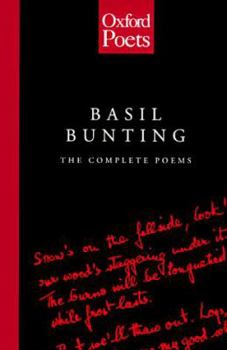The Complete Poems
Select Format
Select Condition 
Book Overview
This is the first time that all the published work of Basil Bunting (1900-85) has been brought together in one volume. The Pious Cat, a poem for children, a little juvenilia and a few limericks are included, with Bunting or Caddell's light annotation as appropriate. Bunting's poems were praised by Ezra Pound in 1938, and first admired by American poets, but he has since acquired an English readership. His translations have been greatly admired, and his long poem Briggflatts remains the classic introduction to this fine poet.
Format:Paperback
Language:English
ISBN:0192822829
ISBN13:9780192822826
Release Date:December 1994
Publisher:Oxford University Press, USA
Length:240 Pages
Weight:0.55 lbs.
Dimensions:0.8" x 5.4" x 8.5"
Related Subjects
PoetryCustomer Reviews
1 rating
Basil Bunting - A Neglected Voice
Published by Thriftbooks.com User , 22 years ago
It is often said prophets are never appreciated in their own land, and in the case of Basil Bunting this adage seems particularly apt. Praised by Ezra Pound, whose disciple he was, and feted by the likes of luminaries William Butler Yeats and TS Eliot, his work remained virtually unknown to the outside world until 1966, when the (North of England based) Fulcrum Press brought out Briggflatts, an epic poem drawing on elements of inner autobiography and Northumbrian folklore. Then his career kicked off in earnest, with the result that we are now able to see Bunting for what he is; a great Modernist poet whose work will undoubtedly last.This edition brings together the majority of Bunting's work he and his executors saw fit to preserve and is definitive. In it you can treat yourself to the First Book of Odes with its brief verses originally published in various magazines and pamphlets that published the work of poets prepared to make poetry count after the foggy Neo-Romanticism of the Georgians had all but rendered it irrelevant. Alongside is the Second Book of Odes, mainly assembled in 1965 after Bunting, neglected and working on a newspaper in Newcastle England had been rediscovered by counterculture poet Tom Pickard. These poems are brief and lyrical, reinforcing Bunting's belief that "poetry is to be heard", and are sometimes hard to get into. However, they repay a certain amount of rereading and rapidly become memorable. The same can be said for the "Overdrafts" - free verse versions of poets as diverse as Horace, Virgil, Firdosi and Rudaki. Bunting spoke Persian fluently (he worked in Iran for part of his life) and his translations are highly accessible.The highpoint of the book, however, must be "Briggflatts". "Brag, sweet tenor bull/Descant on Rawthey's madrigal". It is described by the poet as "an autobiography", but it communicates on a far deeper level than simply that. Items of myth, music and art are fused ably together, and the effect is of an English Modernist masterpiece rivalling Eliot's "The Waste Land" and Hart Crane's "The Bridge". The poem experiments with sonata form, as do "Villon" and "The Spoils" among others.Bunting was Pound's follower, but he avoided his political excesses and linguistic boasting. He also perhaps managed a higher level of originality, for whilst like Pound and Eliot he was happy to draw on sources, Bunting seems to have weaved his heritage into his work in a way in which the joins are less obvious. His concern was primarily with music, and he had, whilst making it new, to make connections with sound in the manner of the Troubadours or wandering minstrels. His work deserves every new reader it gets.Enjoy





